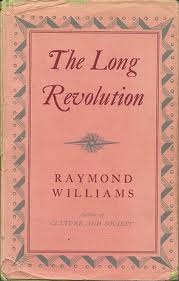Top Qs
Timeline
Chat
Perspective
The Long Revolution
1961 book by Raymond Williams From Wikipedia, the free encyclopedia
Remove ads
The Long Revolution is a 1961 book by Raymond Williams.[not verified in body]
This article is missing information about the title subject, the book, itself—it's scope, content, background, and publication history, which are altogether, with already appearing content, unsummarised by the article's lead. (May 2025) |
Remove ads
Background
This section needs expansion with: a set of statements suited to the length of other sections, drawing on current and further sources to provide the scholarly and cultural background for the title work. You can help by adding to it. (May 2025) |
The Long Revolution is a followup to the author's earlier work, Culture and Society, a "literary diagnosis of the English social predicament".[1]
Summary
This section needs expansion with: a set of statements suited to the length of other sections that provides a summary of the title work, as described by reliable published sources. You can help by adding to it. (May 2025) |
Herbert Gans, writing in The New Leader, notes that this work, as his earlier, is composed of a set of separate essays (that, as such, are not a systematic treatment of its subject).[2]
Remove ads
Publication history
This section needs expansion with: a set of statements suited to the length of other sections providing a standard publication history, with associated formal inline citations. You can help by adding to it. (May 2025) |
The Long Revolution was first published in English 1961 by Chatto & Windus.[citation needed]
Reception
Summarize
Perspective
In a mixed review, Denis William Brogan wrote in The New York Times, "In The Long Revolution, he follows up his deservedly admired Culture and Society with a more contemporary, less literary diagnosis of the English social predicament. It is a moving, often convincing, always readable book, but it is a disappointment after Culture and Society. It is a disappointment because Mr. Williams shows less penetration, less generosity than in his previous book. One reason for this is that Mr. Williams is totally 'committed' to a socialist view of society and a socialist remedy. He is also committed to a basically romantic view of 'the workers'."[1]
Writing for the International Journal of Cultural Policy, Michael Volkerling said that The Long Revolution "while by no means the most coherent text, proved to be the most useful". He praised Williams' "critical perspectives and conceptual analysis that proved to be both compelling and apposite".[3] In a review for The New Leader, Herbert J. Gans wrote, "One wishes only that Williams had presented his argument in a more systematic fashion. The present volume, like his earlier book, is a series of separate essays, and both suffer from the discontinuities inherent in this form."[2]
The New Left Review's Edward Thompson praised the book, writing, "Even a brief passage of his writing has something about it which demands attention—a sense of stubborn, unfashionable integrity, a combination of distinction and force."[4]
Remove ads
References
Wikiwand - on
Seamless Wikipedia browsing. On steroids.
Remove ads

